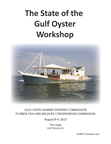 |
The State of the Gulf Oyster Workshop
The Gulf states continue to face challenges in traditional oyster fishery management so the GSMFC and the FWC hosted a two-day, State of the Gulf Oyster Workshop to discuss the status of the traditional, wild harvest oyster resources in each state as well as a few of the innovations and management tools being developed. Three representatives from each state agency were invited to participate at the roundtable workshop in August 2023 and covered topics like restoration efforts, adaptive management, and stakeholder engagement. Increased funding and ongoing research will be crucial to address the complex issues surrounding oyster fisheries in the Gulf Coast region moving forward. |
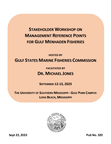 |
Stakeholder Workshop on Management Reference Points for Gulf Menhaden Fisheries
A final Gulf Menhaden stakeholder workshop reviewed the Goals and Objectives identified by the participants in the previous two workshops and outlined the pros and cons of a number of reference point options including ecosystem-based ones. The participants included all the Gulf states’ management agencies, NOAA Fisheries, and several non-governmental entities and tried to reach consensus on what reference point options were viable at this time. The results of the discussions will help guide the next Gulf Menhaden stock assessment in 2024. |
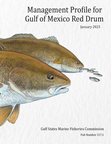 |
Management Profile for Gulf of Mexico Red Drum
A comprehensive review of the biology of a species or species group and includes a description of the fisheries as well as discussion on the distribution, habitat, and any knowledge of genetics specific to the Gulf Region. The profile summarizes any existing state management including laws, regulations, and policies as well a description of the social and economic importance of the species. A biological profile highlights any knowledge gaps that may exist which could limit future management. A management profile identifies data gaps which may hinder future determination of stock status and effective management in the region. |
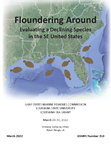 |
Floundering Around - Evaluating a Declining Species in the SE United States
A regional symposium "Floundering Around – Evaluating a Declining Species in the SE United States" to look at the current status of flounder species in the Gulf, South, and Mid Atlantic. |
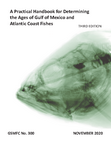 |
A Practical Handbook for Determining the Ages of Gulf of Mexico Fishes, Third Edition
A Practical Handbook for Determining the Ages of Gulf of Mexico and Atlantic Coast Fishes - Third Edition includes contributions from many more agencies and universities from the Gulf region as well as the Atlantic. A number of techniques and species are described beyond the original scope of the First and Second Editions of the manual. We have tried to provide information on all the various techniques that have proven to be useful or unsuccessful for each of the species covered and ensured that validation is included wherever possible. It is hoped that the wide variety of species will allow anyone interested in exploring the ageing of fish species new to them or their agency to find common techniques and accounts which will shorten the time required to pursue something that can be a trial and error process. The most widely used methodologies and approaches are included in each species account but additional methods and details can be found in the appendices. |
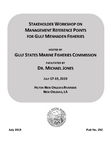 |
Stakeholder Workshop on Management Reference Points for Gulf Menhaden Fisheries
In an effort to generate appropriate reference points for Gulf menhaden management, the Gulf States Marine Fisheries Commission hosted a workshop of stakeholders to begin to address the goals of management to meet the needs of the fishery and the associated fishery participants. This was the second workshop in the series which tested a number of the reference points and control rules for the fishery explored during the first workshop. |
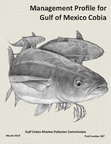 |
Management Profile for Gulf of Mexico Cobia
A comprehensive review of the biology of a species or species group and includes a description of the fisheries as well as discussion on the distribution, habitat, and any knowledge of genetics specific to the Gulf Region. The profile summarizes any existing state management including laws, regulations, and policies as well a description of the social and economic importance of the species. A biological profile highlights any knowledge gaps that may exist which could limit future management. A management profile identifies data gaps which may hinder future determination of stock status and effective management in the region. |
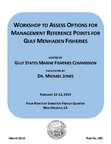 |
Workshop to Assess Options For Management Reference Points for Gulf Menhaden Fisheries
In an effort to generate appropriate reference points for Gulf menhaden management, the Gulf States Marine Fisheries Commission hosted a workshop of stakeholders to begin to address the goals of management to meet the needs of the fishery and the associated fishery participants. The workshop was the first of several that will occur as we explore reference points and potential harvest control rules for the fishery. |
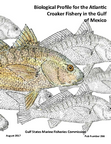 |
Biological Profile for the Atlantic Croaker Fishery in the Gulf of Mexico
A comprehensive review of the biology of a species or species group and includes a description of the fisheries as well as discussion on the distribution, habitat, and any knowledge of genetics specific to the Gulf Region. The profile summarizes any existing state management including laws, regulations, and policies as well a description of the social and economic importance of the species. A biological profile highlights any knowledge gaps that may exist which could limit future management. A management profile identifies data gaps which may hinder future determination of stock status and effective management in the region. |
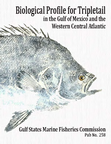 |
Biological Profile for the Tripletail Fishery in the Gulf of Mexico and the Western Central Atlantic
A comprehensive review of the biology of a species or species group and includes a description of the fisheries as well as discussion on the distribution, habitat, and any knowledge of genetics specific to the Gulf Region. The profile summarizes any existing state management including laws, regulations, and policies as well a description of the social and economic importance of the species. A biological profile highlights any knowledge gaps that may exist which could limit future management. A management profile identifies data gaps which may hinder future determination of stock status and effective management in the region. |

